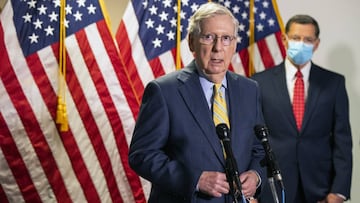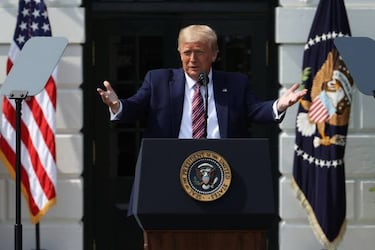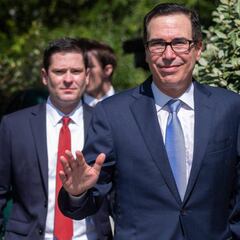Second stimulus check and other proposals on the Senate table
Millions of American businesses and households are eagerly awaiting news on the next recovery package, with much still to be debated and agreed.

Millions of Americans have been awaiting news of what the next stimulus package will look like. The answers to that question have been speculated on, with Republicans and Democrats speaking out during various interviews or presentations, hinting at when more help may be coming.
The latest word on timings from Senate Majority Leader Mitch McConnell stated that Monday 20 July will see the plans being laid out for agreement and the negotiations can, hopefully, reach a conclusion quickly.
Three weeks to agree stimulus package
With the Senate in recess from 10 August, and another bill long overdue in many people’s minds, there is a belief that the final decision will be ratified by then. That gives the US lawmakers around three weeks to deliver.
- $600 benefits boost: next stimulus bill needs to hurry
- Second stimulus check $40,000 limit: calculate how much you can get
- Paycheck Protection Program (PPP): will I be taxed on my loan?
- Second stimulus check: what is known about July payment?
- Revealed: what companies got PPP loans?
- Income cap on second stimulus check expected to be higher than $40,000
One of the key comments that McConnell and others have been floating is regarding a second stimulus check for American households. Whereas the CARES Act introduced a payment with a $75,000 salary threshold, a second payment is potentially looking to be only for those earning up to $40,000. These, according to McConnell are “the people who have been hit the hardest” and he added that “many of them work in the hospitality industry. The hospitality industry, as all of you know, just got rim-racked - hotels, restaurants - and so [more stimulus checks] could be part of it. The country needs one last boost."
Not everyone is on the same page about the lower limit, something that will have to be thrashed out, but IRS stimulus checks are not the only element of the recovery package that needs to be discussed. Based on a report from Bloomberg, the plan being put forward next week will include some of the schemes already in place, such as tax incentives for businesses to retain employees and unemployment insurance benefits.
House Speaker, and Democrat, Nancy Pelosi, is also pushing for a quick resolution saying about getting it done before the recess or delaying the break, ”We absolutely have to. The timetable is the timetable of the American people needing their unemployment insurance, their direct payments, their assistance for rent and mortgage foreclosure forbearance."
So what else is still potentially up for discussion?
Small business funding: both Democrats and Republicans appear keen on extending the Paycheck Protection Program, which is due to expire on 8 August. One question is whether or not it will be adapted following some criticism of the list published by the Treasury Department - in an attempt at transparency - which revealed some interesting recipients.
Payroll tax cuts: the idea of a payroll tax cut to encourage people back to work has, unsurprisingly, been put forward numerous times by President Trump.

Business liability protection: the idea that businesses could be punished by future legal cases related to their employees being infected by Covid-19 after returning to work, for example, is something that is desired by many Republicans. Democrats, on the other hand, generally don’t see that as the best use of the bill.
State and local funding: the HEROES Act that passed the House of Representatives included the provision for just short of $1 trillion to be earmarked for state, local and tribal authorities to help cover the pandemic costs of areas such as police, health workers, at-risk teachers etc. This is not an element that Donald Trump and Republicans are in favour of and instead argue that it would just be a bailout of some poorly managed states.
Related stories
Infrastructure investment: as well creating new jobs, the desire to aid America’s economic recovery by repairing the country’s infrastructure is supported on both sides of the aisle.
Education and health funding: although those on the right are much keener than those on the left to get children back to school, everyone agrees that investment in schools to make them safer is a good idea. The same agreement applies to health care where hazard pay for front-line workers is a generally accepted part of the new bill, with the president also backing it publicly.

